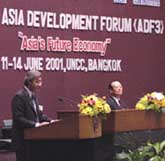|
Governments
and globalization
How real is globalization? Governments
only pay it lip service, says John Robertson as they
try to introduce bureaucracy to trap those who would contribute
to their nation's standing
IT WOULD SEEM that the topic of globalization is on everyone’s
mind these days.
Governments love to tell us what a wonderful job
they’re doing to free up borders, unleash money flows, and boost
the transfer of goods and services.
But are they really? A government praising itself
for "globalization" policies is a bit like a mugger giving
himself a pat on the back for not killing you during the robbery,
merely beating you and sending you to the emergency room instead.
After all, governments have been major thieves
of transnational liberty as well, not just the liberty of citizens
within their own borders. A major part of government bureaucracy
is devoted to border controls, immigration, customs, import and
export regulations, excise taxes and duties, and various other controls
designed to stop you from doing what you wish when moving yourself
or your assets across borders.
Liberty is the ability to control your own mind,
body and overall life without outside interference. History has
demonstrated that when liberty is denied the economy stagnates,
the national culture withers, science and innovation shrink, personal
living standards plummet, and the overall quality of human life
regresses.
Liberty is therefore of vital importance. But
when one cannot move oneself or one’s property easily, then an intolerable
situation in a given country becomes exponentially worse. A country
becomes an economic, financial, and physical prison once the government
decides to maximize its control over its people. Is it any coincidence
that the world’s most totalitarian regimes have the most repressive
policies against citizens leaving the country or allowing businesses
free access to capital and international markets?
The current buzzword process of "globalization"
is nothing more than an indirect recognition that governments are
causing more problems than they solve with senseless protectionist
laws and policies. So they are releasing their chokehold a little
while they search for a better grip that increases their revenues
without letting the beast of international capitalism rise up and
render them as extinct as the dinosaur.
In other words, "globalization" as praised
by politicians is a way for governments to retain (and grow) their
control over citizens and the economy by inserting themselves as
a necessary force needed to make international trade and trafficking
possible.
We need government assistance to conduct international
trade the way a moose needs a hat-rack, but try telling that to
a high-ranking bureaucrat who has decided that it’s in the national
interest for government to tell its own citizens what they may or
may not do elsewhere in the world. (Or, for that matter, tell foreign
citizens what’s best for them when they try to make the most of
an opportunity within the national borders.)
True globalization doesn’t need any government
regulation at all, other than the maintenance of general law and
order. So the sooner the floodgates are opened, the better. But
"free trade" has a way of acquiring veritable encyclopædias
of footnotes once bureaucrats start meddling with this tariff and
that excise tax and similar misadventures. Free trade becomes nothing
more than a lie, with "freer trade" substituted as a worthy
goal in its place.
The protestors who keep showing themselves at
the various international trade conferences hosted by the World
Bank and the IMF and similar organizations
have only half of the right idea. Abolishing these multi-national
bureaucratic monstrosities is a worthy goal, but then the protestors
shoot themselves in the foot by demanding closed borders, supposedly
to protect poor Third World workers from exploitation from evil
capitalists.
The only way for Third World workers to rise out
of poverty is through the accumulation of wealth. What better way
to do that than to work for a large international company that provides
jobs where none existed earlier? The worker gets a job, an income,
and valuable experience, the company gets relatively cheap labour,
and both parties benefit. Is this such a crime? We’re sure that
a rice farmer whose annual income is only a few hundred dollars
a year is hardly feeling exploited when he works a few hours less
per week to earn substantially more at the local outlet of a First
World factory, warehouse, or office.
Are the local Third World governments supposed
to pull these people out of poverty? Hardly. After all, they’re
the main reasons that Third World conditions exist in the first
place. First World governments have realized that a smaller share
of a much bigger pie is worth much more to them than the whole of
a small pie. Third World governments have yet to reach this level
of enlightenment.
But Third World countries aren’t the only ones
which would benefit from free flows of goods, capital, and workers.
First World nations would grow too, both from increased access to
new markets and from plentiful quantities of needed goods and services
at low prices. And there’s always the chance that the next Einstein,
Bill Gates, or Jonas Salk is waiting to be discovered when the appropriate
education and opportunity reaches someone presently in a disadvantaged
jurisdiction. The whole world benefits from geniuses like these.
And so ultimately, no one’s a loser once true
globalization happens. Except governments themselves, of course,
which is why "globalization" government-style will be
the way the game is played until people finally wake up and realize
the bureaucrats and their politicians do more harm than good.
Prosperity is the best way to true happiness in
life, and the government’s regulation of it (however well-meaning)
doesn’t help anyone in the long run. John Robertson
Dr
John Robertson of OPC International provides powerful freedom solutions
to current and future sovereign individuals. Visit www.assetprotection.nu
for more information.

Home | The
Front Desk
Your feedback is welcome
|
